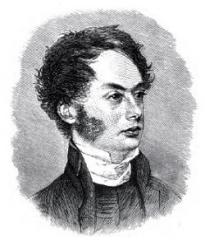
1800 - 1874 Translator of "Story Of The Shepherd" in The Cyber Hymnal Churton, Edward, D.D., son of the Ven. Ralph Churton, sometime Archdeacon of St. David's and Hector of Middleton Cheney, Northampton, was born in 1800, and educated at the Charterhouse and Christ Church, Oxford, where he graduated in honours, in 1821. He was for some time one of the Masters at Charterhouse. He took Holy Orders in 1826; was the first Head Master of the Hackney Church of England School, 1830; Rector of Crayke, 1835; Prebendary in York Cathedral, 1841; and Archdeacon of Cleveland, 1846. He died July 4, 1874.
Archdeacon Churton's works include: (1) The Early English Church, 1840. (2) Memoir of Bishop Pearson, 1844. (3) Lays of Faith and Royalty, 18-15. (4) Memoir of Joshua Watson, 1861. He also edited several works, including Lays of Faith and Royalty, 1845, &c. He is known to hymnology through his work, The Book of Psalms in English Verse, 1854. This is commonly known as the Cleveland Psalter. The Preface is of more than usual interest and value. Of his renderings of the Psalms, some of which are of great excellence a few have come into common use, the best known being, “God of grace, O let Thy light." The following, mainly in Kennedy, 1863, are from the Cleveland Psalter:—
1. Come, arise and let us go. Ps. cxxxii.
2. Earth with all thy thousand voices. Ps. lxvi.
3. For ever, Lord, Thy faithful word. Ps. cxix. .
4. God of truth, all faithful Lord. Ps. cxliii.
5. God my hope, my strength, my King. Ps. cxlv.
6. God rules in realms of light. Ps. xciii.
7. How shall I render to my God. Ps. cxvi.
8. I lift mine heart to Thee. Ps. xxv.
9. If our God had not befriended. Ps. cxxiv.
10. In Thee, O Lord, I trust. Ps. xxxi.
11. Lord, hear me, grant my sorrows boon. Ps. lv.
12. Lord, hear my suppliant prayer. Ps. cxxx.
13. Lord, hear the voice of my complaint. Ps. v.
14. Lord, I have called on Thee; for Thou. Ps. xvii.
15. Lord, my heart is with the lowly. Ps.cxxxi.
16. Lord, my Rock, to Thee I cry. Ps. xxviii.
17. Lord, to my sad voice attending. Ps. lxi.
18. O happy state on earth to see. Ps. cxxxiii.
19. O praise the Lord, for He is love. Ps. cxxxvi.
20. O stand in awe, and fear to sin. Ps. iv.
21. Raise the psalm to God all glorious. Ps. xcviii.
22. 'Tis the day all days excelling. Ps. cxviii.
23. To Thee our guilty deeds. Ps. xc.
24. Whene'er to Thee I make my prayer. Ps. lvi.
Archdeacon Churton's translations from the Latin, Spanish, and Anglo-Saxon, were included in his Poetical Remains, Lond., 1876.
--John Julian, Dictionary of Hymnology (1907)
=================
Churton, Edward, p. 233, ii. From his Cleveland Psalter the following are also in common use:—
1. High raised upon the holy hills. Ps. lxxxvii. It begins in some collections with stanza ii., "O Zion, glorious things to come."
2. Lord, keep me for I trust in Thee, Be Thou. Ps. xvi, Cistercian Breviary, p. 179, i.
--John Julian, Dictionary of Hymnology, Appendix, Part II (1907)
Edward Churton

